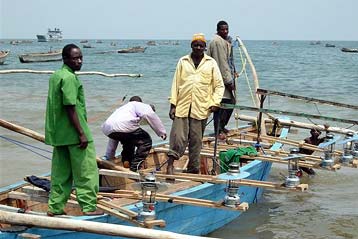Casting the net wide to help Burundi's returnee communities
Casting the net wide to help Burundi's returnee communities

RUMONGE, Burundi, August 22 (UNHCR) - Born on the shores of Lake Tanganyika, in Burundi, Leon Solomon Nimfasha has always loved fishing.
His passion for his chosen métier was so strong, that after the seven years he spent in a refugee camp in Tanzania, he came home and continued casting his nets to support his family.
And thanks to seed capital from the UN refugee agency - he and his fellow fishermen now have three brand-new boats, lamps and nets to boost their catch.
"It was difficult to find financing individually," says Nimfasha, 39, who had been just scraping by since he, his wife and five children came home in 2003. But thanks to help from UNHCR for the self-help cooperative he belongs to, "I am very satisfied. It has improved our family's conditions and it offers a chance to improve the community."
Nimfasha is one of the beneficiaries of an innovative project being run funded by UNHCR in southern Burundi that gives loans - not grants - to associations formed voluntarily by the Lake Tanganyika fishing community - both men and women - themselves. It's one of several reintegration projects designed to ease the acceptance of returnees back into their home communities, and promote their ability to support their families. In Nimfasha's hometown of Rumonge alone, 14,000 refugees have come home from exile in Tanzania in recent years.
Under the strict supervision of UNHCR reintegration officer Anas Roudies, the beneficiaries had to present solid business plans before they qualified for help. They pledged to repay the cost of the fishing equipment within a limited period, usually a year; next year the money will be ploughed back into the community to fund more projects.
"The idea is that they have to be responsible for their future, instead of just looking to us [UNHCR] to give them money," says Roudies, who has a background in business management and public policy.
So far, five collectives have been given what are called fishing "kits" consisting of a motorized patrol boat to protect against pirates on Lake Tanganyika, and two connected outrigger fishing boats which drag a net between them. As the fishing is done by night, special lamps are also part of the kits. The boats are made in local boatyards, like the one in Rumonge, giving employment to other workers as well.
Roudies has been encouraged to see his hard-headed business approach being adopted by the fishing community. "Because they have to pay back the money, they are becoming more responsible and stricter with their own members," he says. "One association has already replaced their president because they didn't think he was business-like enough."
The project, launched in June just as the height of the fishing season was approaching, was intended as a pilot project. But it's already been so successful that UNHCR will hand out 10 more "kits" at the end of this month to enable more fishermen to take to the lake, the second-deepest lake in the world, and an extraordinarily rich source of fish.
Under other reintegration projects, UNHCR is rehabilitating schools and giving goats to women's associations to complement seasonal farming and boosting women's incomes when the goats are sold at hefty profits.
"We are trying to help whole communities, so people who stayed don't become jealous of the returnees," explains Roudies. It's working, says fisherman Nimfasha. "It's contributing to good coexistence," he says with a smile.
Any income earned from selling the catch so far is going to repay the loans. But even though they don't yet have any extra cash in their pockets, the members are seeing a benefit: a certain percentage of each catch - usually the small fish that don't sell well - is given to each member.
"My family is eating better now, thanks to the fish we get," says association member Josephine Nzobonimpa, a mother of nine who says her husband's subsistence farming was barely keeping the family going.

The fishing community is thinking ahead. They could get five times more money for their catch if they had a refrigerated truck to take it to the capital, Bujumbura, to sell, instead of having to accept whatever price the buyer from the big city offers them. As a backup, they would like help in drying and smoking the fish to extend its shelf life. Such dreams will be achievable, Roudies tells them at a meeting, if they continue working profitably and harmoniously together.
And fisherman Nimfasha is already thinking really long-term. "If the association prospers, my children will benefit because they will inherit my place in the association," he says earnestly.
By Kitty McKinsey in Rumonge, Burundi








